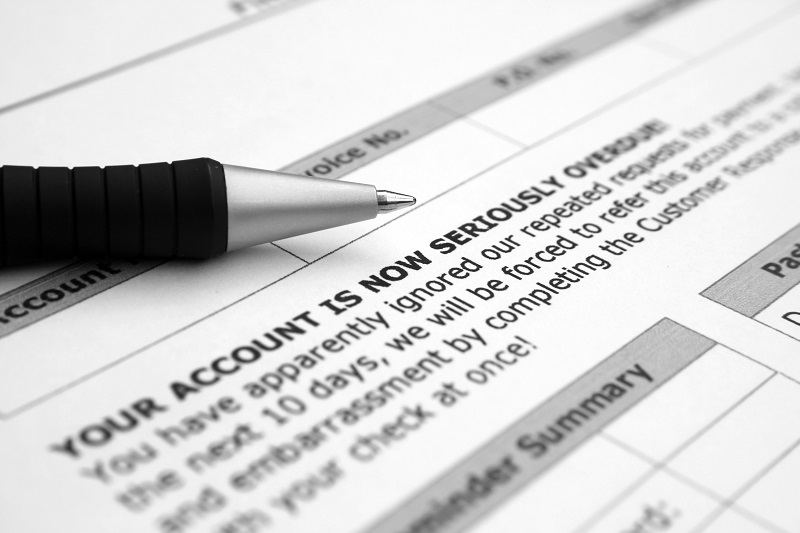Is It Better If I Pay Off Collections or Wait?
If you have a debt in collections and you’re not sure how to handle it – you’re not alone. Millions of people owe a debt in collections. You know it’s affecting your credit (negatively) so you want to make an informed decision. Should you pay off collections or wait for them to go away on their own?
You will consider negotiating the debt to pay a lower amount, or you may decide to wait for the impact to lessen with time. You may wonder what other options you have.
Let’s take a better look at the nature of debt in collections, how collection agencies profit from your misery, and what’s your best option when dealing with debt.

What are Collection Accounts?
Our credit reports serve as a window to our financial responsibility and payment history. The listed accounts show both favorable and unfavorable information. An example of “favorable” information would be an account with a good credit utilization ratio. An example of “unfavorable” information would be a collection for an unpaid medical bill.
If you don’t fulfill your obligations – such as paying off a loan – it will be visible on our credit report. If the debt is sent to a collection company, then it will classified as a collection account on your credit reports. You defaulted on our obligation and that, naturally, has a negative impact on your score.
In other words, if the original lender doesn’t want to chase you for payment, they enlist the services of a collection agency. This third-party business works on the lender’s behalf to collect the whole amount of debt you owe (or as much as they can collect).
When that happens (the debt being sent to a collection agency), it drops your credit score and damages your chances to get approved with the best interest rates.
With that being said, here are two considerations when deciding to pay off your collections or wait.
Debt Settlement with a Collection
Debt settlement is the process of paying for an old debt for less than the owed amount. Collection agencies buy debt from original creditors at favorable prices, so they can afford to settle for less.
If you do settle, ask for the collection to be removed completely from your credit. You should ask for this in writing. While debt settlements shouldn’t necessarily be your first choice, it may avert possible expensive lawsuits that will cost much more in the long-term.
Your State’s Statute of Limitations
If your account has been inactive for a long time, your debt may have passed the statute of limitations threshold. In that case, you are not obliged to pay the debt, and neither can you be sued for it.
Actually, debt collectors can sue you after the statute of limitations, but all you have to do in court is present a valid defense and prove that your debt is now time-barred (this is another term for something beyond the statute of limitations).
So if you are torn between paying your collections or waiting, the first step is to inform yourself of the statute of limitations in your state.
Bear in mind that debt settlement isn’t the best idea if debt is beyond the statute of limitation. That is because making a payment can reset the statute of limitations.
What Happens If I Wait Instead of Paying My Debt Right Away?
As your debt gets older, it impacts your credit scores less and less. That means that paying the old debt may not boost your credit score a lot. In that sense, it may be reasonable to wait seven years. Because after that, the debt gets automatically erased from your credit reports.
But is waiting seven years really worth it? Is it worth the badgering you’ll experience in the meantime from debt collectors? Is it worth the possible lawsuits you will have to deal with?
While you can <b?sit around and wait for your debt to go away on its own, you will see your other plans hindered by the debt you owe, too. Loan applications, credit applications, mortgage applications – all of these are harder to get approved for if you have outstanding debt on your report. And even if you do get approved, you may get a higher interest rate. You don’t want to pay thousands of dollars more than you need to.
A Third Option for Handling Collections
If you are just a few months away from your debt passing the 7-year mark (or whatever the statute of limitations for your state), then wait it out and see it drop off of your report on its own. If that’s not the case, then consider dealing with the debt and the collectors.
A third option is removing the collection through a credit repair process. Removing a collection from a credit report through disputing and auditing has multiple benefits. That’s what we do at White, Jacobs and Associates. Every collection has a story behind it and we’d love to hear it. When you reach out to us, you’ll speak with an experienced credit analyst that will review your reports in detail and talk through your options. We’ll talk about each collection and the likelihood of removal. After that, you’ll be able to make an educated decision on how to proceed.
